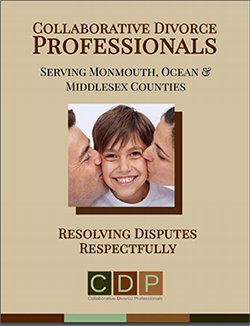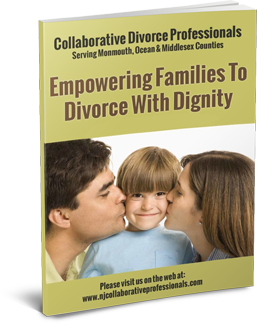Collaborative Family Law Helps Take Litigation Out of Divorce
by Bill Mooney
John Caroli knows what it is like to go through a divorce.
About six years ago, after 24 years of marriage, the Atlantic Highlands financial planner and his wife, an attorney, parted.
And however else the experience transformed him, one change was completely unexpected: He became a champion of a practice generally known as collaborative family law, a procedure that requires parties to a divorce to negotiate face to face and in good faith.
“My attorney said, ‘Listen. This process is going to save you time, it is going to save you money, it is going to save you whatever is left of your relationship with your wife, and it is going to minimize toxic stress on your children,’” Caroli said.
His attorney was right, so much so that Caroli now serves as a neutral advisor on financial matters to other couples using collaborative family law to negotiate their divorce.
He feels that if he can provide a neutral viewpoint to help parties equitably settle on support and alimony then he has provided a needed service that helps the divorcing parties and the children involved.
He also prefers not to work as a financial advisor on more litigious cases.
Now, collaborative family law may be codified in New Jersey — if pending legislation passes.
If the bills — S1224/A1477 — become law, New Jersey will join approximately 39 states that utilize this approach as an alternative to conventional divorce.
The collaborative family law movement began in the 1980s and is practiced in some form in about 29 countries.
In New Jersey there are more than 500 lawyers practicing it in varying degrees, according to Linda Piff, a Wall Township attorney who has been involved in family collaborative law since 2005. She is president of the New Jersey Council of Collaborative Practice Groups and trains others in the practice.
“Often litigation starts out with a declaration of war and children are the victims,’’ she said. She believes that the collaborative process not only saves wear and tear on the participants, but also can relieve crowded court dockets.
According to her estimates, the average family collaborative law divorce takes about 6.9 months, compared with anywhere from 12 to 18 months for contested divorces.
In addition, Piff said that the collaborative approach is generally a third of the cost of litigating a divorce case.
The way such a process works is that the divorcing parties hire lawyers to assist them but negotiate face to face about dissolving the marriage and dividing assets.
The direct contact makes a difference, according to Caroli.
“If you go to litigation,’’ Caroli said, “You’ve got a lawyer lobbing letters and the other lawyer lobbing them back. In our process, you have to negotiate in good faith and stay on track.”
In a traditional divorce, Caroli said that the people involved run the risk of a judge making a decision that will just anger one of them even further. In his case, the process ended up taking over a year, but it did save money in the long run.
Taking his and his ex-wife’s education and income levels into consideration, Caroli said, “I think if we had litigated . . . we could have turned it into a spectacular income stream for the lawyers.”
Not every family collaborative process ends successfully. If the parties cannot come to an agreement, they can proceed to the regular divorce court, but the lawyers who helped with the unsuccessful collaborative negotiations are not allowed to represent the parties in the traditional divorce litigation.
According to Piff, there is an 88 percent success rate nationally and in New Jersey — based on one study of about 250 cases from a random sampling over two years — there is about a 91 percent success rate.
But if the process is growing and is proving so successful, why is legislation necessary?
“So there is no misunderstanding about the parameters of what this is,’’ said Sen. Loretta Weinberg, (D-Bergen), who sponsored the Senate bill that cleared the Judiciary Committee 12-0 in March. The Assembly version has not been heard yet.
The Senate bill has been sent to the Budget Committee for consideration because it could represent a savings to the state in reduced court costs.
The legislation will provide uniformity, according to Piff, as well as mandating full disclosure of all relevant information when the parties employ this process. In addition, she said it will extend confidentiality privilege to neutral third parties.
The lawyer-client relationship is privileged already, “but we often have mental health professionals’’ assisting, Piff said. “They can only get the privilege against disclosing communications by statute. The bill is to give that confidentiality.”
Under the bill, the parties sign an agreement to use this alternative to the courts, and then, with the assistance of lawyers but without a judge presiding, negotiate toward a resolution.
Once all matters are agreed to, the completed document will be presented to a judge who will question the parties to ensure they understand and agree to it. The legislation is based on recommendations from a 2013 New Jersey Law Revision Commission report.
“It seems like an appropriate way to handle what are usually emotional and sensitive issues,” Weinberg said. “It seems like if we can avoid courts and avoid extra bureaucracy that comes into all that and antagonistic issues that always result from that, this is a good way to do it.”
But no one is presenting family collaborative law as a cure-all.
Make no mistake, said Caroli, “It was painful. You are sitting facing the person and making a decision. You have to sit there and think it through, and it’s different than hiding behind an attorney.
“On the other hand,” he said, “I do own the outcome. I don’t love it, but I can live with it.”






